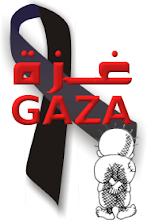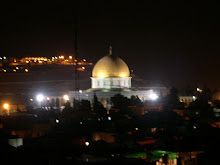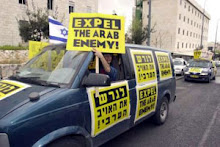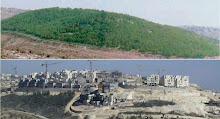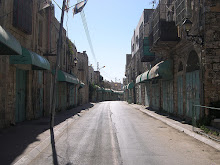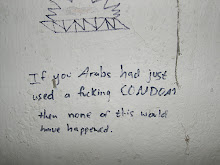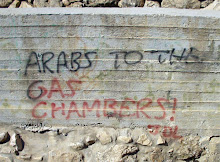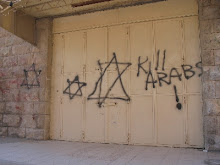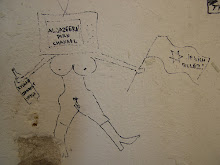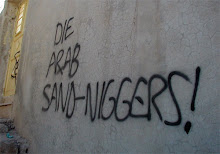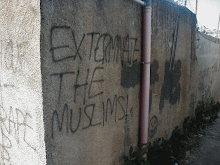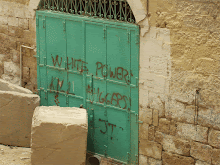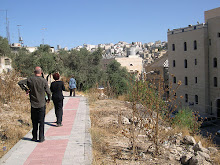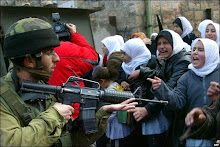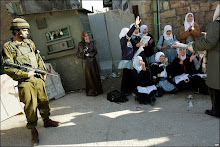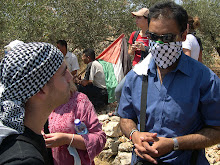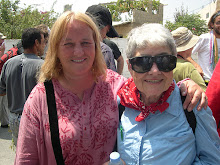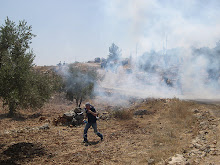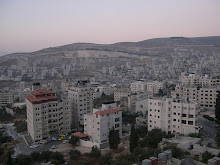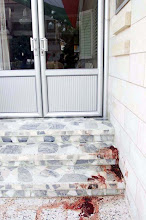 We arrive in Ramallah from Hebron mid-afternoon on day 6, just in time for our first meeting which is with Defence of Children International-Palestine (DCI-Pal), http://www.dci-pal.org/. We are received by RS, who is an Australian citizen of Palestinian origin but works in Ramallah. Our aim here is to gather information about the abuse of Palestinian children's rights by Israel.
We arrive in Ramallah from Hebron mid-afternoon on day 6, just in time for our first meeting which is with Defence of Children International-Palestine (DCI-Pal), http://www.dci-pal.org/. We are received by RS, who is an Australian citizen of Palestinian origin but works in Ramallah. Our aim here is to gather information about the abuse of Palestinian children's rights by Israel.We learn that 888 Palestinian children have have been killed at the hands of the Israeli military and settlers since 2000. To put this figure into perspective, as a proportion of the population of the United States this figure exceeds 90,000 children. Circumstances of death include clashes, house demolitions, random military gunfire, air and ground offensives, and during adult assassination attempts. It is incredible that one hardly ever hears about this in the Western media. Since Oct 2006 alone, 106 children have been killed (10,000 if extrapolated to the US population).
There are 384 Palestinian children in detention in Israeli prisons, including children under the age of 14. Note that these are not special facilities for children- these are Israeli military prisons. When a child is arrested, this is often by forced entry into the house. Handcuffing is the rule. It is not uncommon for him/her to be detained upto 2 months without even being charged. Verbal and physical abuse (including torture) is routine. As a result, a forced confession is extracted in over 90% of cases. The case is tried in an Israeli military court- this is a complete farce, as no evidence is required for conviction- the forced confession is enough. Therefore an arrest almost always results in a jail sentence. Usually the child does not see a lawyer till the first day of court. There is no right of appeal to a civilian court. This whole procedure is in complete contravention to the UN Charter on the Rights of the Child.
The majority of children are charged with stone-throwing- other allegations include throwing Molotov cocktails and being a member of a banned political organization (this includes all Palestinian political organizations- even Fatah, which is in power in the West Bank!)
We are then shown a film about child detainees in which they described their stories of arrest, torture and detention. One of the children was shot dead by a soldier at a checkpoint because he 'looked like he might be carrying a gun'. It was actually a toy.
We go to our hotel filled with disbelief- this is how the 'only democracy in the Middle East' treats children. Needless to say, Israeli children are never subjected to this procedure- there is a special framework of juvenile courts and detention centres for them. Under Israeli law, one is an adult if over 18 if Israeli- but over 16 if Palestinian.
Our hotel is extremely comfortable, and after a rest and a shower we decide to hit Ramallah city centre. We are so disturbed by the experience of the last two days that we want to spend the evening relaxing in a restaurant avoiding any political discussion. However that is not to be- our taxi driver asks us where we come from, and upon hearing the word 'Britain' he utters the word 'Balfour'. He then produces the key to the house which his family was forced to flee in 1948 when Israel was created.
It is clear that Palestinians haven't forgotten that Israel is ultimately Britain's creation- the taxi driver is referring to the Balfour Declaration of 1917, which gave Britain's blessing to the creation of a 'Jewish homeland' in Palestine. It was clearly stated at the time that the opinion of the inhabitants of Palestine was inconsequential to this decision.
It is obvious that the driver has no personal quarrel with us, indeed he welcomes us as friends of Palestine. But I completely understand the resentment Palestinians feel against Britain and the rest of the Western world. Britain has a huge share of the responsibility for their plight- yet instead of campaigning for their cause, our government sells weapons to Israel to use against civilians. Not only that, Britain has preferential trade agreements with Israel and when the Palestinians dared to oust the corrupt Fatah government and replace it with Hamas, we participated in starving them with sanctions.
We have a fantastic meal in a Mexican restaurant (yes, they exist in Palestine, and so do Italian and Indian restaurants. And believe me, the food is wonderful!) We then headed back to the hotel- tomorrow we are in for a once-in-a-lifetime experience. A demonstration in Palestine.
M from the ISM meets us in Ramallah city centre at 11 am on day 7. We then take a servees to the village of Billin 40 mins away. Billin's residents are about to have their livelihood snatched- the Wall is under construction here, and it will take away 60% of the village's agricultural land. For the past 3 years, the residents have been holding this demonstration every Friday. There is always a large international contingent, and indeed we meet a variety of activists- American, Danish, British and of course Israeli. An 82-year-old Israeli woman is among them. The Israelis are from a group called Anarchists Against the Wall- they come every week, and one of them once sustained a serious head injury from a rubber bullet. But he has recovered and is demonstrating with us today! I have a lot of admiration for these people's courage- Israelis who act against the occupation are usually ostracized as traitors by friends and family, and indeed by Israeli society in general.
We are unsure whether to simply observe or to actually participate in the demonstration. Eventually 7 out of 8 people decide to go (remember we are now 8 since J, the other doctor, joined us). We will leave if things get really nasty. The village children provide us with sliced onions- good for protection from teargas. You simply hold the onion to your nose to prevent breathing the fumes in.
The march is a riot of colour, with people from all over the world bearing Palestinian scarves and flags. There are many children as well. The Arabic slogan is 'La, La, l' il-Jidaar' (No, no to the Wall). We walk down a dusty slope to the site of the Wall- where there are armed soldiers and tanks. Barbed wire has been laid across the path. Our aim is to cross the wire. A soldier wielding a megaphone warns us not to approach as our march is 'illegal' and this is a 'closed military area'.
We congregate behind the barbed wire, the Palestinians and Israelis leading us. We have no weapons, stones or sticks. Never again tell me that the Palestinians should adopt nonviolent resistance. They have been protesting nonviolently for years.
You may call me insane for participating in this march. However I am glad I came. If only to witness how the Israelis treat Palestinians protesting peacefully. All we are doing is walking to the site of the Wall.
Nothing can prepare you for your first experience of teargas. When it touches your eyes, it is as if somebody has rubbed chilli powder into them. However what is worse is the effect on your airways. Despite the onions, I inhale some of the fumes. It is as if somebody has set my throat on fire. The gas canisters are red-hot- if they touch your skin they can cause significant burns.
After that first exposure to teargas, some people run back up the hill. However the protest has only just begun. I see the bulk of the demonstrators (mainly Palestinian and Israeli) return to the frontline for more. The teargas shells start flying thick and fast. The soldiers are laughing- to them it is a game, like cat-and-mouse. You are supposed to run in the opposite direction to the wind to avoid the gas- but this is more complicated than it sounds. Mainly because when a shell lands on the ground, it jumps and pirouettes madly before settling. So the gas often blows all over the place. I go back to the front, determined to capture as much of the action as possible on film. I am later told that I make a riduculously comical sight, with a video camera in one hand and a scarf across my mouth and nose, leaping left and right in an attempt to dodge the gas!
J has been at the front for a while and we are worried. He takes a short break- his face is red as a beetroot, with eyes and nose streaming. He tells me that he got caught in a cloud of gas. M is having an asthma attack and has to use her inhaler. Amazingly, she has been coming to this demonstration for years. An ambulance appears and takes away a Palestinian man who is having breathing difficulties.
The soldiers now enter Round 2 of their game- sound bombs. These make a deafening noise and can damage your hearing if they land close to you. M's husband is deaf in one ear as a result.
The next step is rubber bullets. Do not be fooled- these are anything but harmless. They are actually made of metal, only the coating is rubber. Although they do make less of an impact than live bullets, they can still penetrate flesh- and even bone- if one is hit at close range. A few people have suffered serious- even lethal- head injuries from rubber bullets.
Now the Palestinian children are throwing stones. I decide that it is time to leave- I have no wish to get injured or arrested, and my main aim is to witness the violence of the Israeli military- which I have done. I need to get back to the UK in one piece to be able to tell my story! M tells me that nobody has been killed at this demonstration yet, but this is only due to the presence of internationals. If there were only Palestinians protesting, the bullets would be live. J is still at the front and one of us has to drag him away.
On our way back to Ramallah, there is a heated discussion about whether there is any point to these demonstrations. This protest has been going on for 3 years, yet the Wall is still being built, the land is still being confiscated, and the military continues to use violence to disperse the protesters, who risk injury- for what? One can argue that the only solution to this conflict is political, and that will only occur when the international community pressurizes Israel. There is little to be gained by risking lives- including those of children.
However there is another point of view- the international community has failed Palestine, and indeed continues to arm the oppressor to the teeth. Did you know that Israel receives more military aid from the US than any other country receives any kind of aid- including humanitarian? Israel can buy weapons from a private US company and simply send the bill to the US government, which will pay it without question. Faced with such an adversary, if you were a Palestinian farmer whose livelihood was being taken away, and you had no effective police, army, judiciary or indeed government to stand up for you, what would you do? Sit at home and let the Wall steal your land? I can see why they demonstrate at Billin every Friday.
K, one of our group, has been to Palestine before and has some contacts in the Palestinian Authority. She informs them that we are here, and a friendly gentleman called Z invites us to attend a wedding in the evening. It is going to take place in Jalazone refugee camp. Z picks us up at 1830. We tell him about the demonstration. 'Gas or no gas?' he quips.
The wedding is a boisterous event, with an open truck leading the procession. A loudspeaker is mounted on the truck, blaring out Arabic dance music. The truck makes its way up a hill (why is going anywhere in Palestine such an uphill task? Pun intended). It is followed by a crowd of men and women, all clapping and swaying rhythmically. The women are dressed in colourful traditional costumes with intricate embroidery. We learn that there are actually two weddings- two brothers, one of whom has just emerged from jail after 10 years. Periodically, the grooms are hoisted up onto the shoulders of the procession. I catch a glimpse of one of the brides through the window of her car- she is stunning in her white dress. The beat of the music is infectious, and it is impossible not to tap your feet. The women in our group get drawn into the procession by the swaying Palestinian women- I manage to escape as I am filming!
From time to time children come up to me to have their photo taken. 'Hello! How are you? Welcome! What is your name? Where are you from?' I let them handle my camcorder, and they are overjoyed.
I notice the singing and clapping getting louder- soon the reason is apparent. There is an illegal Jewish settlement on a hill right next to the camp, and we are approaching it. We are doing our best to annoy the settlers. Rock on!
We are served cold drinks and cake at the end. It takes forever to leave, as inquisitive children keep coming up to us to practise their English. Also, some people have parked their cars haphazardly, and our car has to negotiate a traffic jam to reach us. We finally depart, touched by the friendliness of the refugee camp.
I get back to the hotel and leave with J to Ramallah city centre once more. We are meeting some interesting people at Angelo's, a popular Italian restaurant. One is a student from the UK. She is taking a year out to do research into the effects of Israeli policies on Palestinian health. We listen to her experience of getting into the country- she has also had intense interrogation. Her friend is also a UK student. She is spending a few months here learning Arabic. R is an American Jewish girl who works with ISM. We listen fascinated as she describes her journey from a Zionist family to total commitment to the Palestinian cause once she found out the truth. Some of her relatives have ostracized her.
We finally head back around midnight. What a day it has been! Tear gas and wedding bells.
Only in Palestine!


